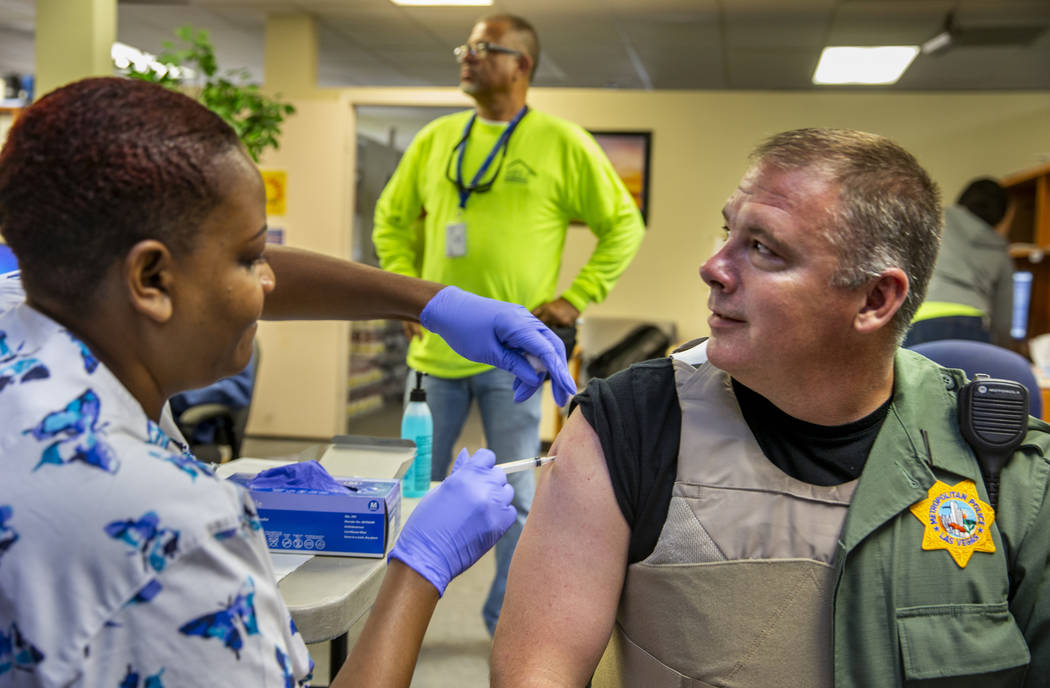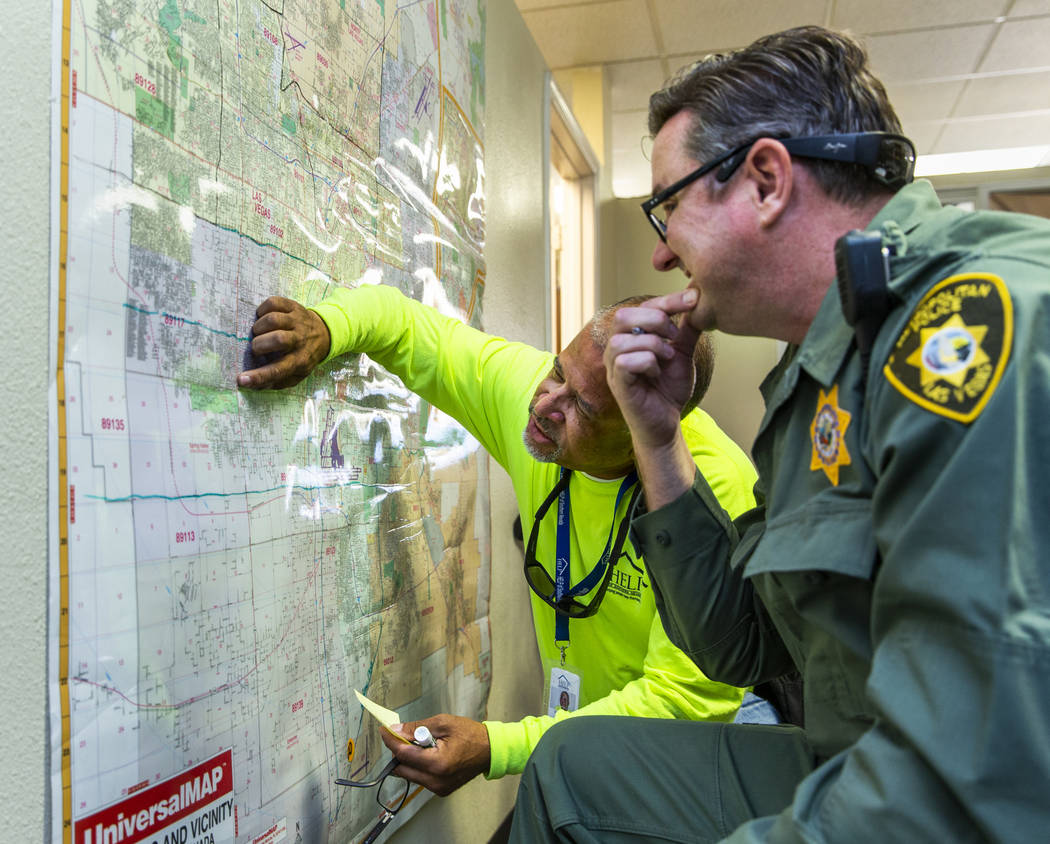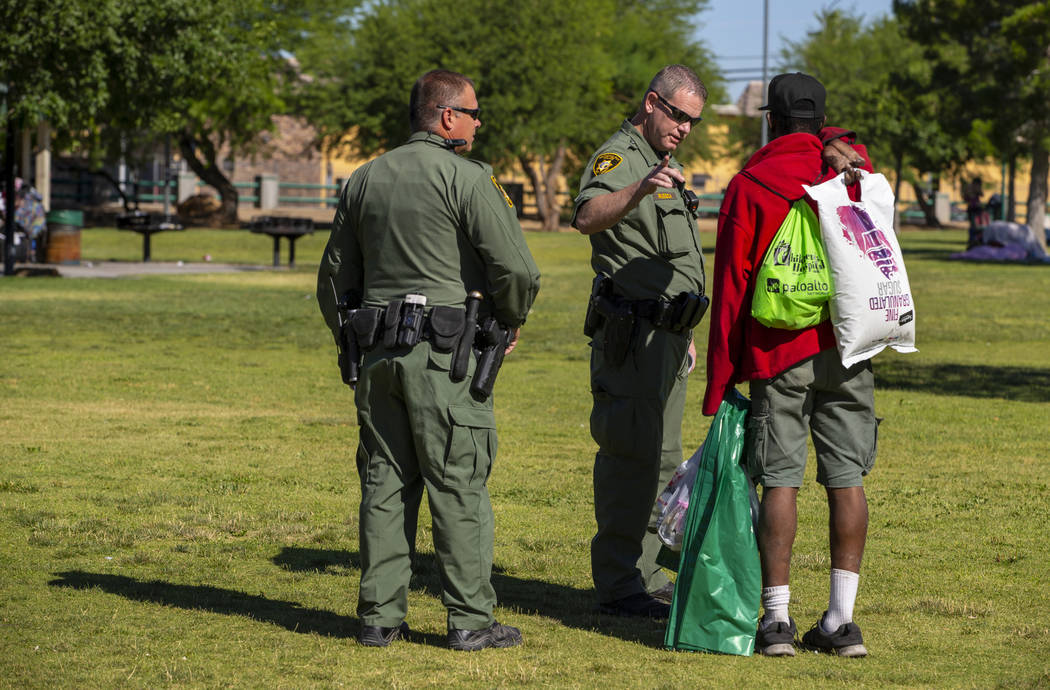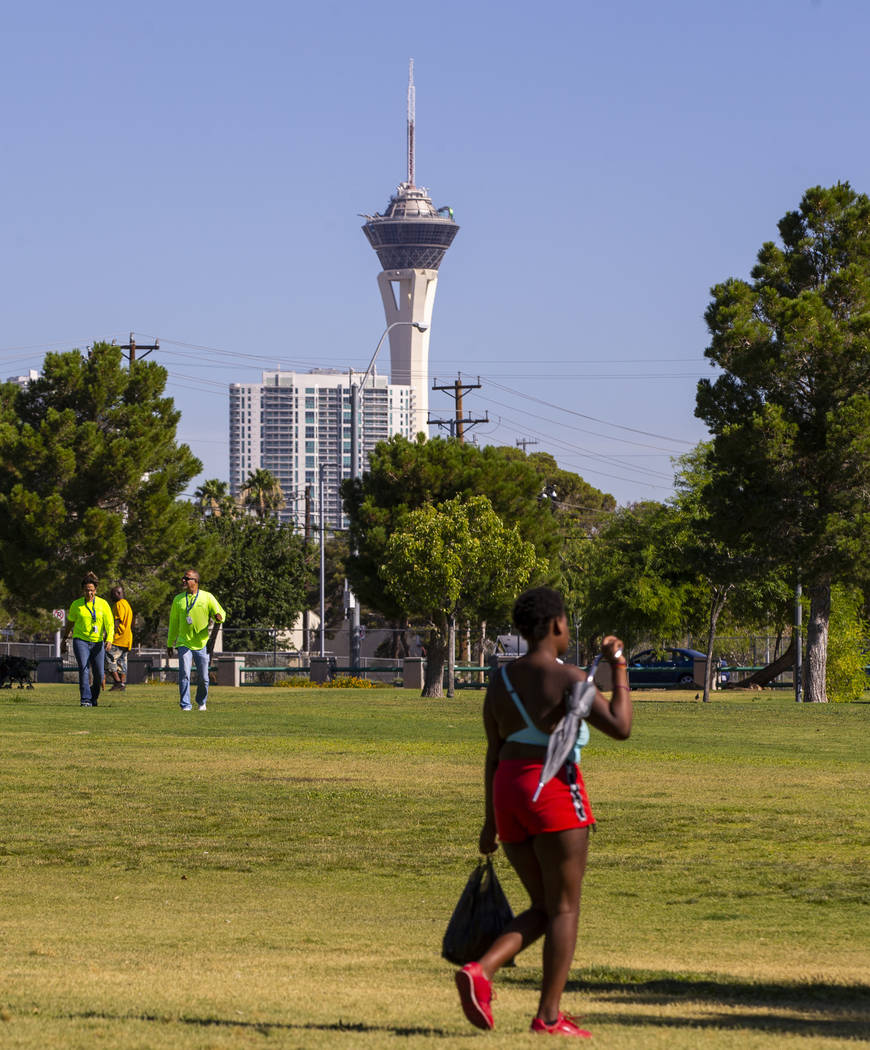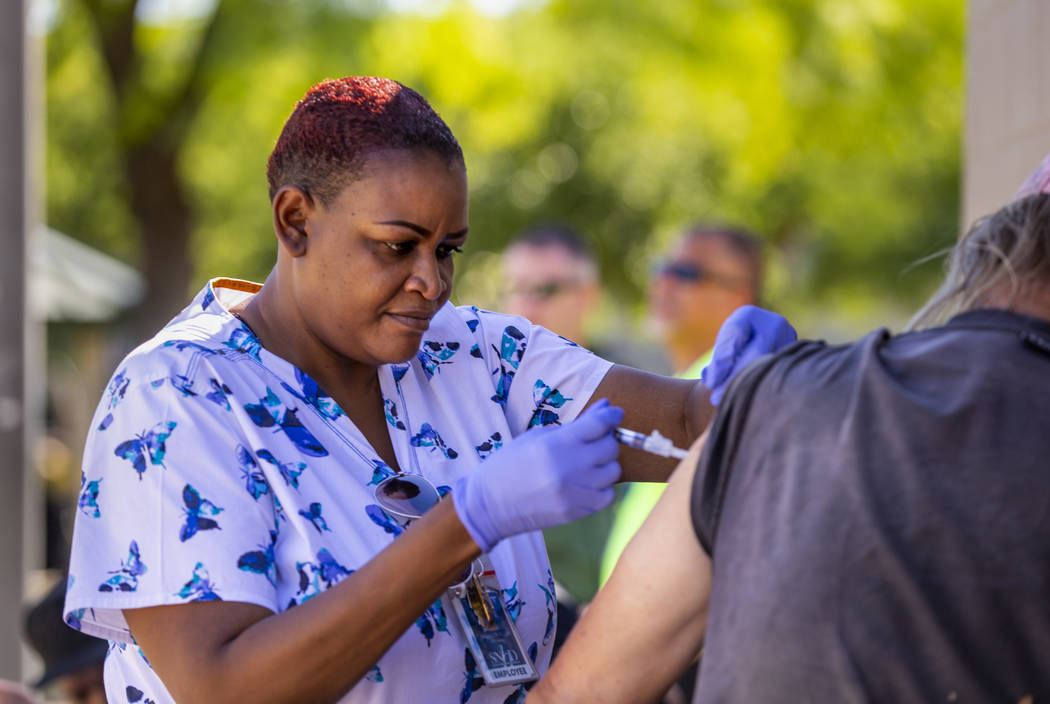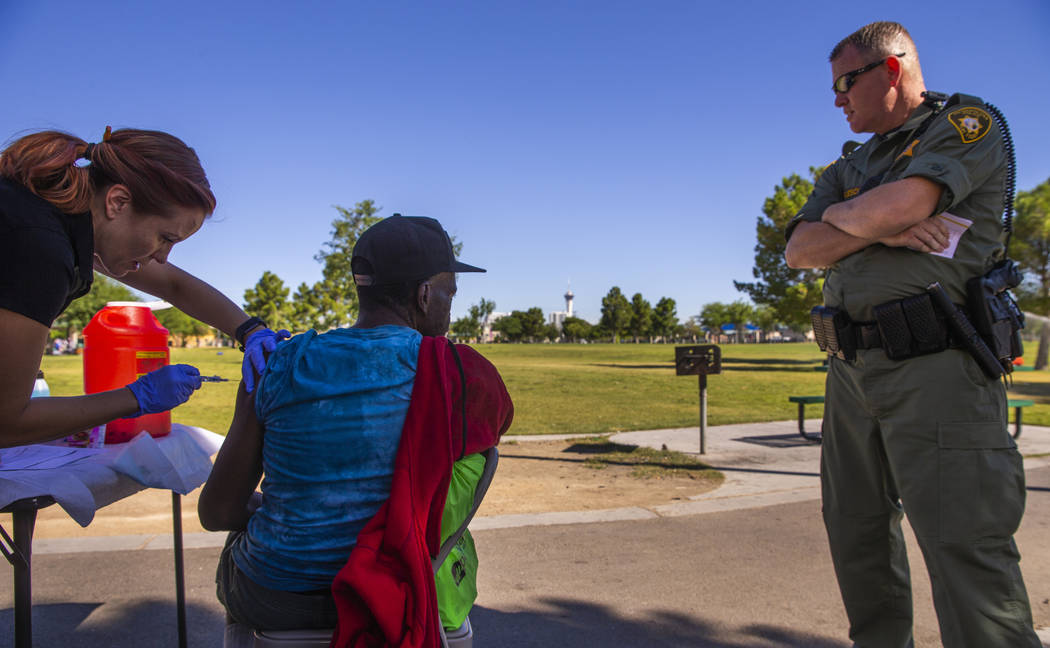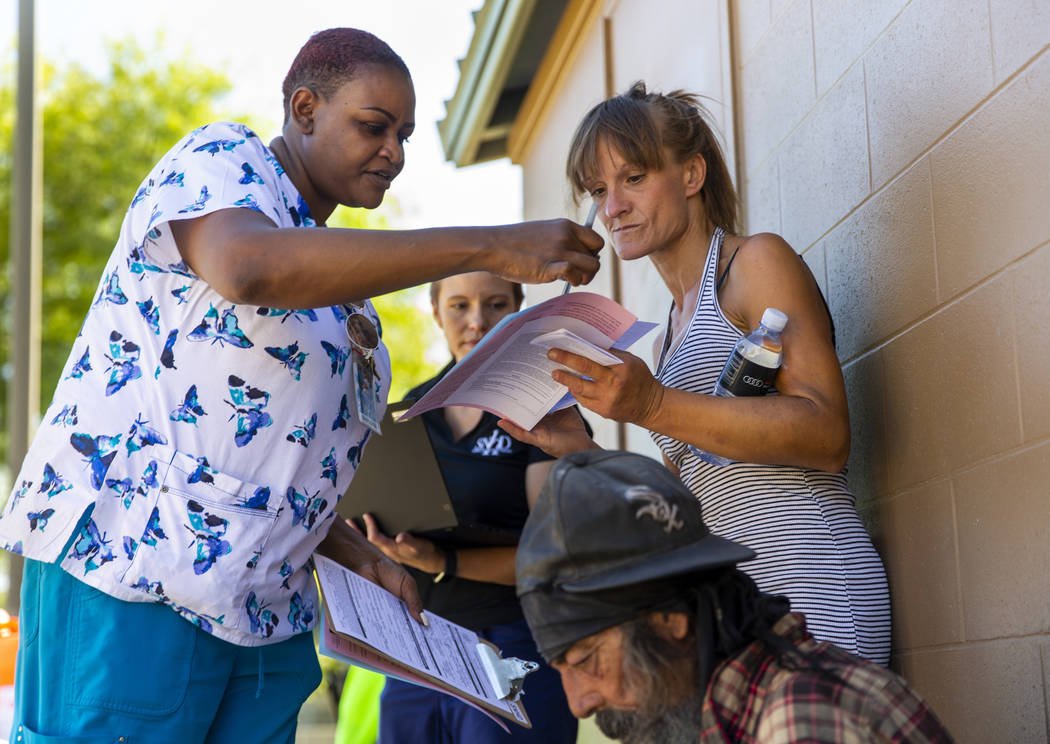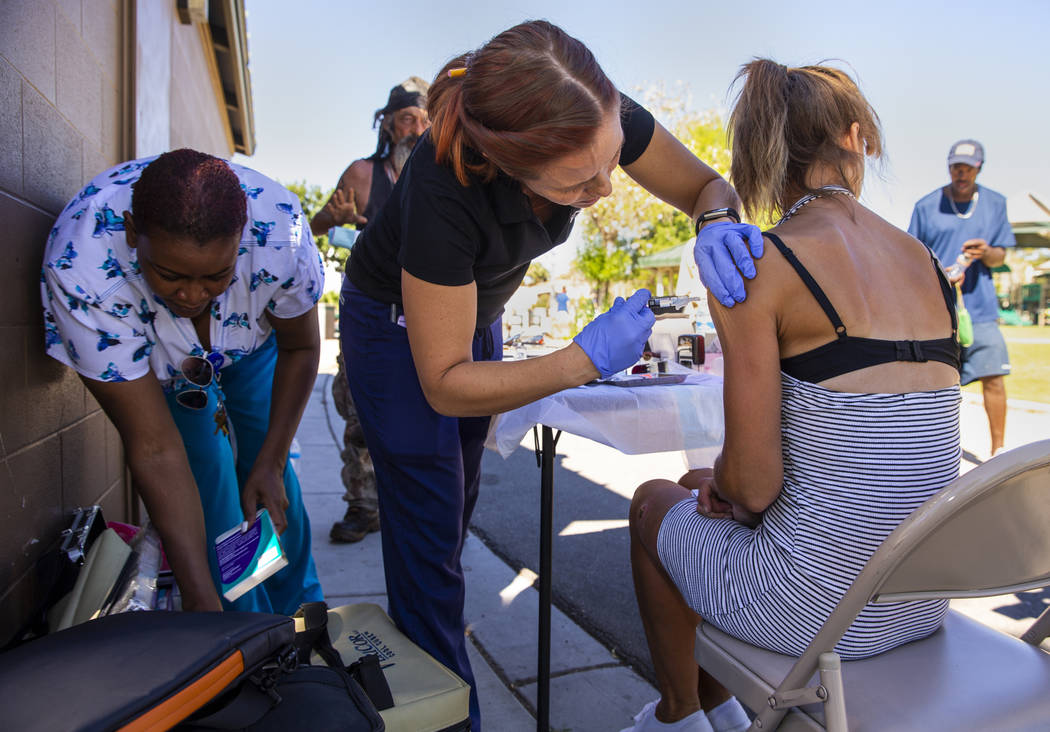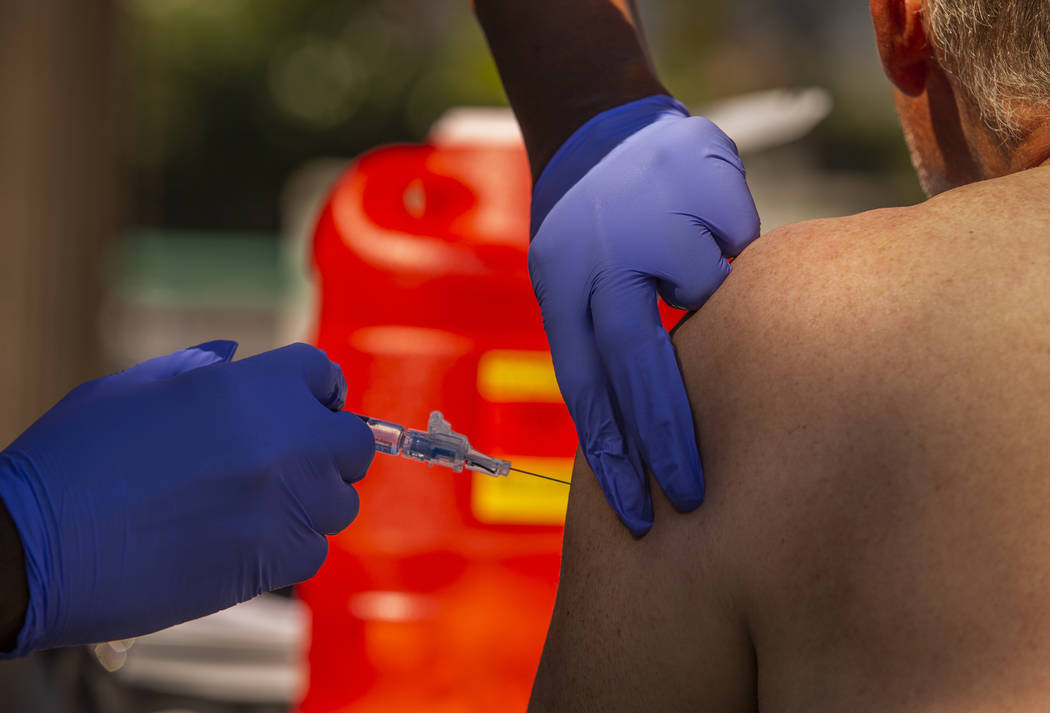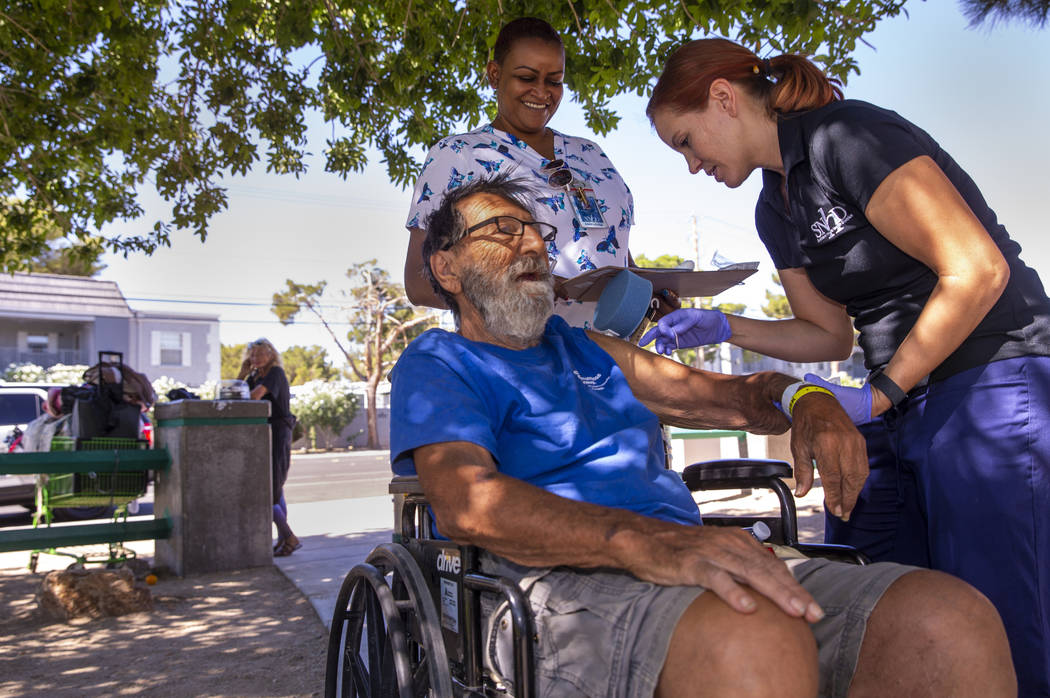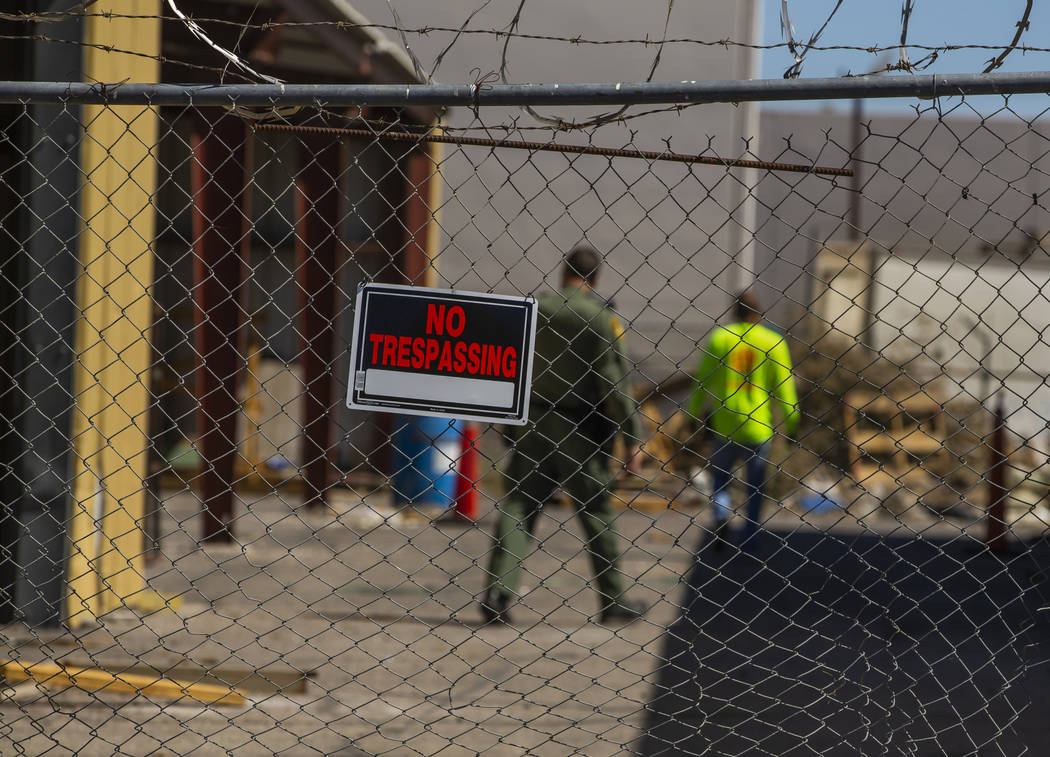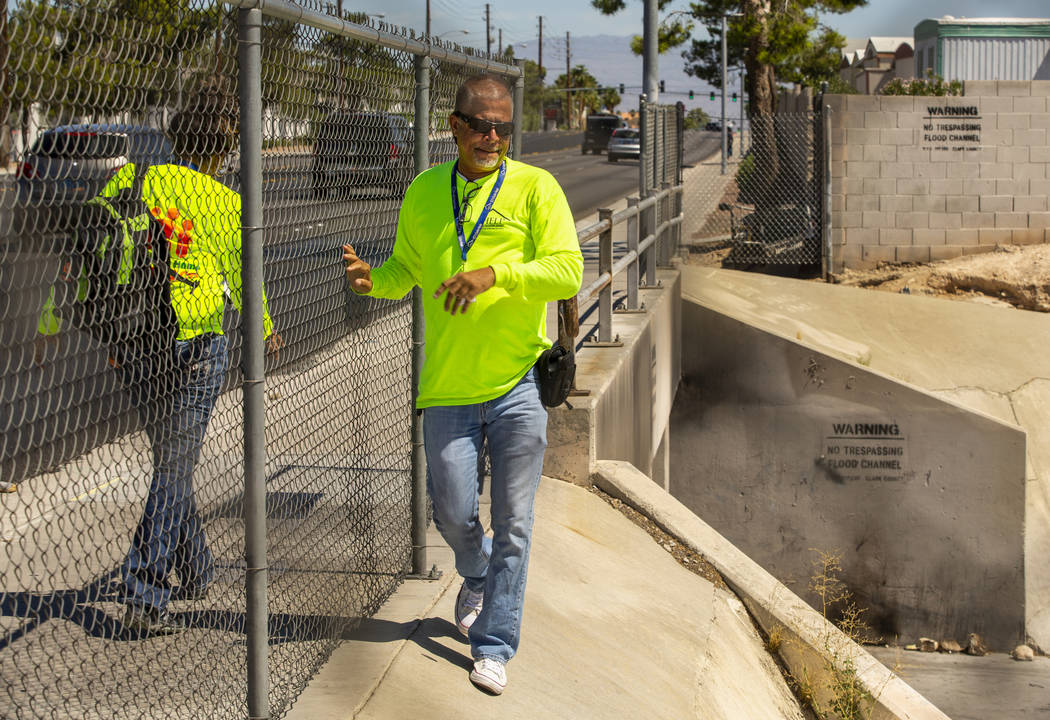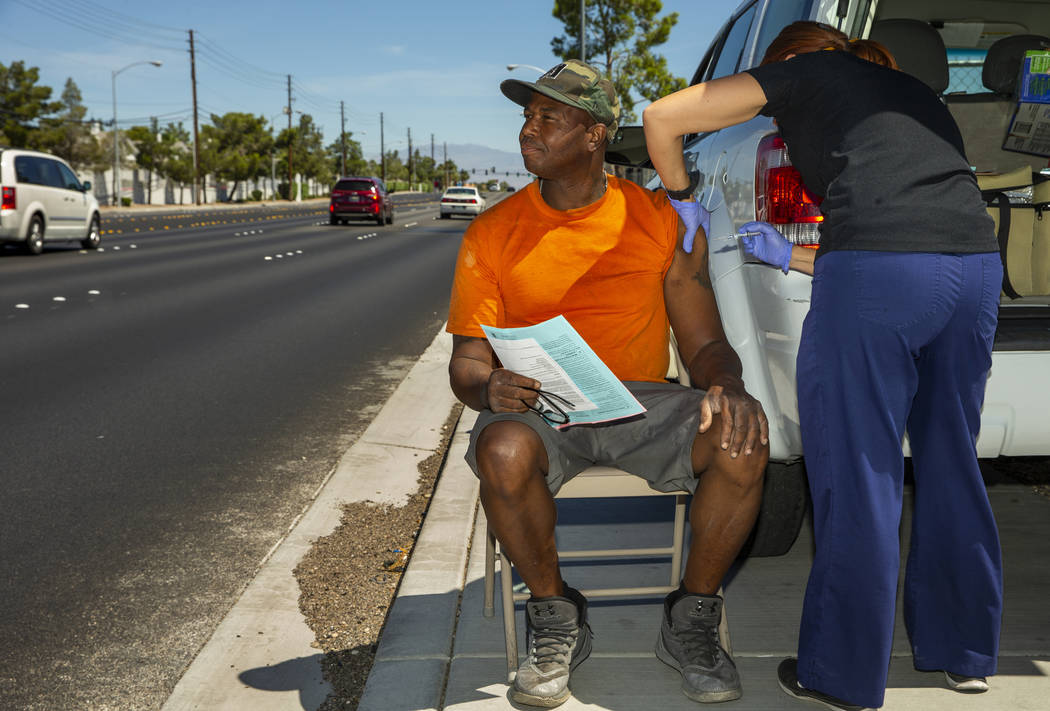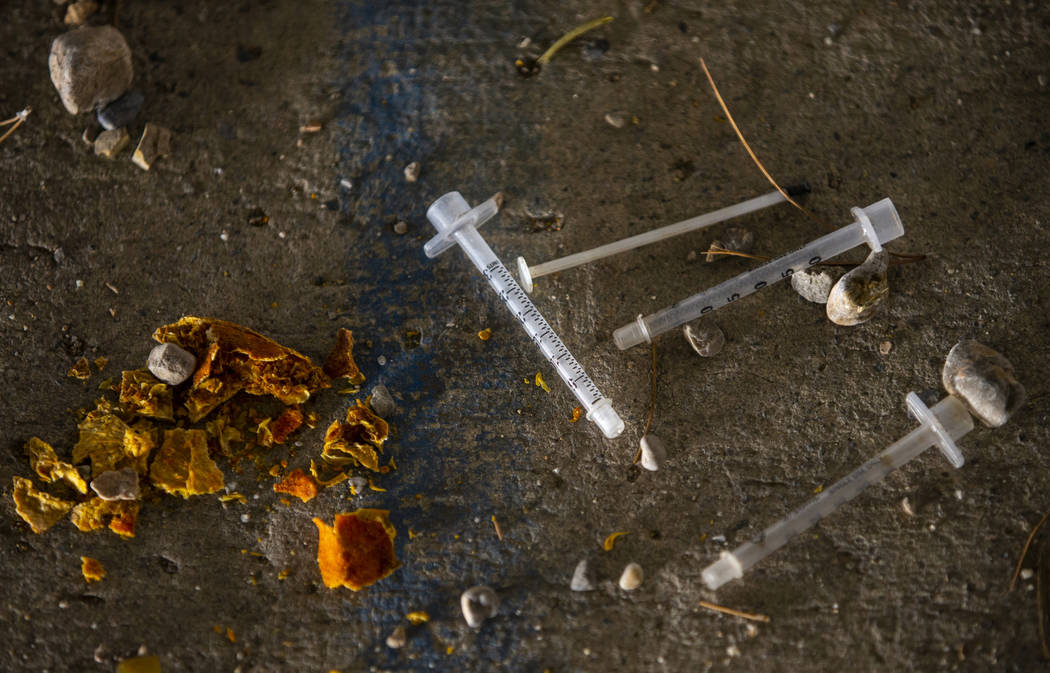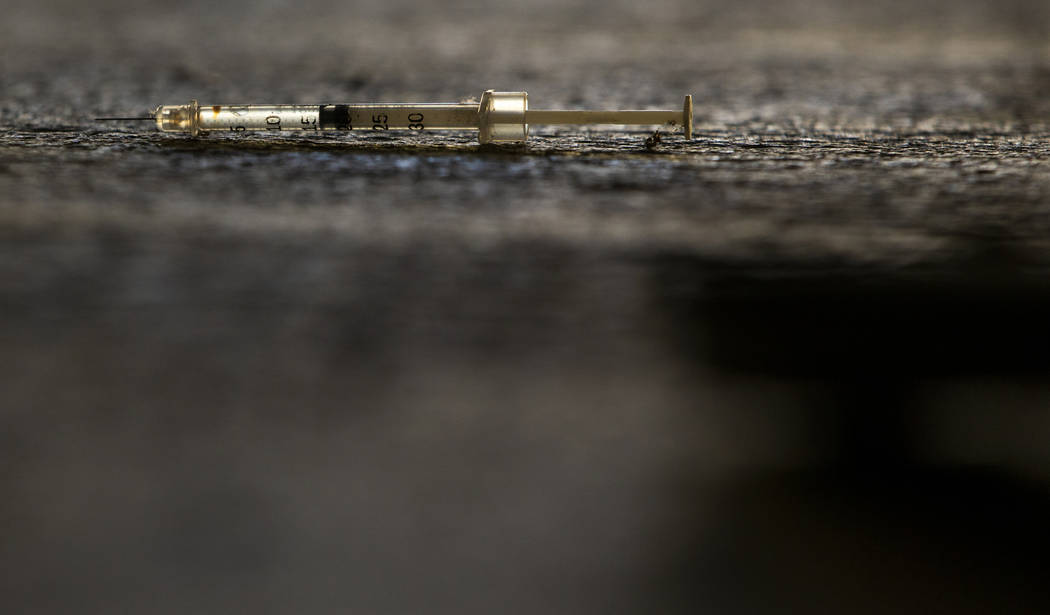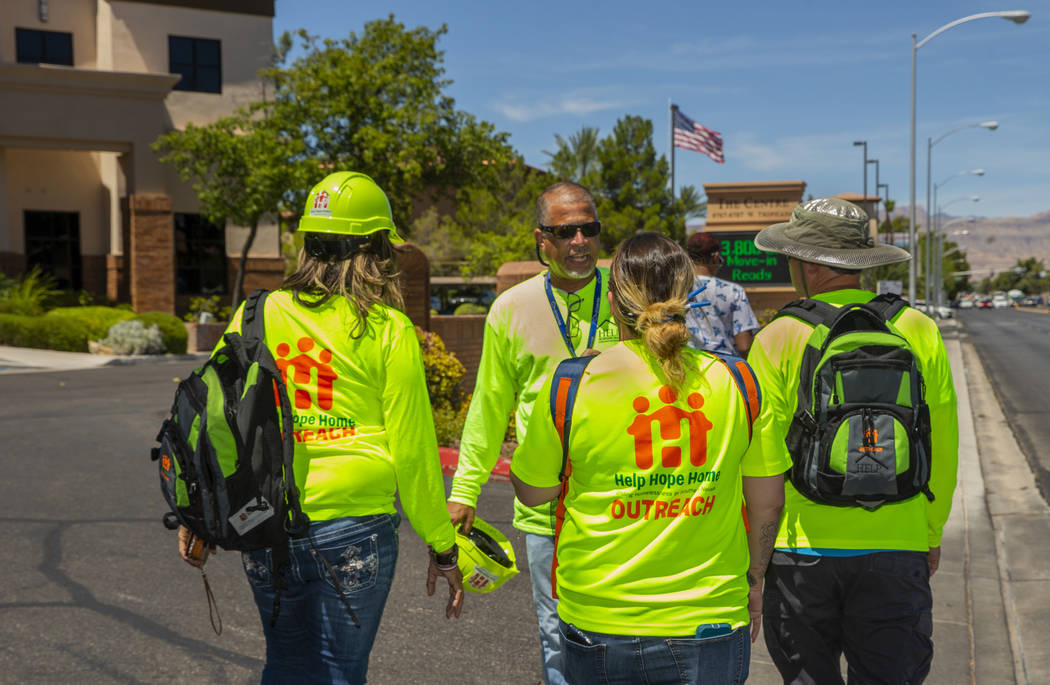Team battles hepatitis A outbreak in Las Vegas
Before the crisis intervention team could set out to visit likely hepatitis A “hot spots” in Las Vegas this week, members needed to get the protection they were going to recommend to those most at risk of contracting the disease.
They lined up for vaccine shots on Tuesday shortly before heading out to conduct outreach efforts among homeless people in Clark County to educate them about preventive measures to check the spread of the disease.
As they did, Louis Lacey, director of crisis teams for the nonprofit HELP of Southern Nevada, huddled nearby with officer Walter Tlockowski from the Metropolitan Police Department’s Homeless Outreach Team to finalize the list of target areas.
“There’s no crying in outreach,” he said, looking over as one his workers winced when she got her shot.
The need for vaccinations among the homeless is significant: As of June 30, there were 50 confirmed local cases of hepatitis A, one of five types of the hepatitis virus, all of which are capable of damaging the liver. Seventy-four percent of those cases involved the homeless, while 94 percent affected users of illegal drugs, according to the Southern Nevada Health District.
According to the district, there have been more Hepatitis A cases in the past six months in Southern Nevada than for the same periods of the past three years combined.
‘It’s alarming’
“It’s alarming,” said Dr. Fermin Leguen, the district’s director of clinical services. “… The biggest concern with this outbreak is that it’s something that is happening nationwide.”
Checking the spread of hepatitis A, which is present in the feces of infected persons and is most often transmitted through consumption of contaminated water or food, requires that the homeless have access to running water and good hygiene. That is why the crisis team was targeting homeless who congregate far from the services provided at the Corridor of Hope in downtown Las Vegas, attempting to persuade the individuals they encountered to get vaccinated and distributing hygiene products.
“With access to running water, it really is wherever they can find it, or in restaurants that allow them or places that are open to the public,” said Fuilala Riley, president of Help of Southern Nevada.
As Lacey, 57, prepared to visit homeless enclaves in drainage tunnels near the airport, he said that he and his team members wear plastic gloves beneath mechanics gloves to avoid catching or spreading infectious diseases themselves. But he acknowledges there are risks even with such precautions.
In 2009, he contracted the H1N1 strain of swine flu after hugging a client and missed work for a couple months. He said it was a lapse in safety protocol on his part.
And there are some places his team won’t go. Off Swenson Street, for example, tunnels are rampant with MRSA bacteria, he said.
But the biggest concern, he said, is to not make the homeless feel “like pariahs.”
During Tuesday’s effort, Lacey and his team members told homeless individuals about the rise in hepatitis A infections and precautions to prevent becoming infected. Two health district nurses set up shop at Molasky Family Park, near the bathrooms, to administer shots to anyone willing to receive one.
Officer Keith Hanoff, also with Metro’s Homeless Outreach Team, announced the group’s presence over the intercom to about 40 people gathered at the park.
“The health department is here if you need to get vaccinated. It’s free of charge,” Hanoff said. “If you need a housing assessment or to talk to your case worker, Help of Southern Nevada is here.”
Vaccine quickly effective
The vaccine for the hepatitis A virus is effective soon after innoculation, though a second dose is required after six months for full coverage.
But even if the homeless don’t get the second dose, they’re still protected from the symptoms of hepatitis A — jaundice, fever, fatigue, vomiting, abdominal pain, dark urine, light-colored stool and nausea — 95 percent of the time, health officials said.
Gino Delleono, a homeless Vietnam-era Army veteran with a long gray beard tied in a ponytail, said he doesn’t usually pay much attention to health warnings from authorities but agreed to be vaccinated this time.
“I don’t be outdoors that much, but anything’s possible, and it’s better to be safe than sorry,” he said.
The team also found Johnathan Hale, 34, receptive to the vaccine once he heard about the surge in hepatitis A cases.
“It’s good to know other people are watching out for us too,” he said. “I don’t have TV, watch the news or interact with others, so sometimes there’s no way to know.”
Later, in a tunnel off South Jones Boulevard and West Tropicana Avenue, team members encountered 59-year-old Dewain Butler, who was using nail polish to paint a picture of two dogs that he hoped to sell. His friend, Victor Shelton, rolled cigarettes on the floor as his Jack Russell terrier mix, Moo Shu, lounged nearby.
Both men refused vaccines.
“I’ve got an immune system that will kill a cat,” Butler said, peering out from behind dark sunglasses.
At the end of Tuesday’s outreach, the team had succeeded in getting 10 people vaccinated — above the 10 percent threshold considered a success for such operations, according to officer Tlockowski.
Word spreads downtown
Word about the hepatitis A outbreak apparently has spread faster near downtown, where nonprofit groups post warnings at shelters and routinely dispense hygiene products.
One group of four homeless people, their faces greasy from the heat as they fixed dinner under the U.S. 95 overpass off 13th Street on a recent evening, said they were aware of the hepatitis risk.
One of them, a 48-year-old woman who asked to be identified only as Shelby, said they had resolved to walk the couple blocks to the Gay and Lesbian Community Center of Southern Nevada so they could exchange used needles used to inject drugs for fresh ones.
“We don’t use dirty needles to fix our dope,” she said.
During her two years on the streets, Shelby said she has learned a thing or two. Stock up on ice at nearby gas stations that will let you. Fill your water up at the Subway. Try to wash your hands once a day.
She also held up alcohol wipes and hand sanitizer.
“I go nowhere without this,” she said.
Contact Briana Erickson at berickson@reviewjournal.com or 702-387-5244. Follow @ByBrianaE on Twitter.
Hepatitis vaccines
The Southern Nevada Health District will administer low or no cost hepatitis A and hepatitis B vaccines at all valley locations. The district will not turn anyone away due to inability to pay or insurance status. The vaccine will be administered at these upcoming events:
— The Nevada Homeless Alliance's Pop-up Project Homeless Connect at the Salvation Army, 35 West Owens Avenue, Las Vegas, from 9 a.m. to noon on July 16.
— The Windmill Library meeting room, 7060 W. Windmill Lane, Las Vegas, from 10 a.m-1 p.m. on July 17.
— The Las Vegas Rescue Mission, 480 W. Bonanza Road, from 3 to 5 p.m. on July 25.
— The Downtown Recreation Center, 105 W. Basic Road, Henderson, from 10 a.m.-1 p.m. on the second Thursday of each month.
— The Clark County Library, 1401 E. Flamingo Road, Las Vegas, from 10 a.m.-1 p.m. on the fourth Wednesday of each month.



